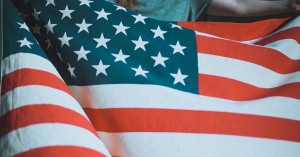
July 4, 1787 – Happy Independence Day!
(Since May, I have been reading through the notes taken by James Madison at the 1787 Constitutional Convention. Every day the Convention was in session, I have posted a summary of the day and an account of the influences on the delegates. I am testing claims that the Bible and Christianity inspired the Constitution as well as satisfying my curiosity about what went into making our Constitution. You can catch up on the series via this link.)
Summary
The delegates were not in formal session today. A subcommittee of delegates was given the task over the July 3-4 break of discussing the Connecticut compromise with a hope that a consensus might develop. Many delegates did take part in various activities around Philadelphia marking the holiday. One such event was an oration by James Campbell titled:
AN ORATION, IN COMMEMORATION OF THE INDEPENDENCE OF THE UNITED STATES OF NORTH-AMERICA, DELIVERED JULY 4, 1787, At the REFORMED CALVINIST Church in Philadelphia, BY JAMES CAMPBELL, ESQUIRE,
TO WHICH IS PREFIXED, AN INTRODUCTORY PRAYER, DELIVERED ON THE SAME OCCASION, BY THE REV. WILLIAM ROGERS, A. M.
PUBLISHED AT THE REQUEST OF THE PENNSYLVANIA SOCIETY OF THE CINCINNATI.
PHILADELPHIA: Printed and Sold by PRICHARD and HALL, in Market Street, between Front and Second Streets. MDCCLXXXVII,
David Barton’s False Links
David Barton falsely claims that the prayer before the oration by Campbell was in response to Ben Franklin’s unheeded call to prayer on June 28, 1787. Barton said on his Wallbuilders website:
In response to Benjamin Franklin’s call to seek God that was made on June 28, 1787, the Rev. William Rogers prayed before the service that was held at the Reformed Calvinist Church in Philadelphia on July 4th of that year. The below text is taken from The Massachusetts Centinel on August 15, 1787.
In fact, as those who are following my Constitutional Convention series know, Franklin’s call went without a vote because only three or four delegates thought it necessary to pray before the proceedings. Rogers prayed on July 4th as requested by the Society of Cincinnati, the group who sponsored Campbell’s oration. This event nothing specific to do with any action in Convention. Barton also tries to link the Campbell speech with a motion made in Convention by Edmund Randolph also on June 28, 1787. From the Wallbuilders website:
Those orders were followed a few days later at the Reformed Calvinist Lutheran Church. In response to Franklin’s appeal, Virginia’s Mr. Randolph offered a counter proposal. He recommended that a “sermon be preached at the request of the convention on the 4th of July, the anniversary of Independence, & thence forward prayers be used in ye Convention every morning.” One report has Washington leading most of the Convention delegates to the church, where James Campbell preached a sermon trusting in the wisdom of the delegates to establish a “free and vigorous government.”
Randolph did make that motion after Franklin’s call to prayer. However, Randolph’s motion, like Franklin’s, was not voted on. In his notes, Madison recorded:
Mr. RANDOLPH proposed, in order to give a favorable aspect to the measure, that a sermon be preached at the request of the Convention on the Fourth of July, the anniversary of Independence; and thenceforward prayers, &c. to be read in the Convention every morning. Doctor FRANKLIN seconded this motion. After several unsuccessful attempts for silently postponing this matter by adjourning, the adjournment was at length carried, without any vote on the motion.
Barton calls Campbell’s speech a “sermon.” You can read it here. The only mention of religion that I can find in this “sermon” is as follows:
Another, and a principal advantage of our Independence, results from the material change it has wrought on the opinions, con|duct and government of the European na|tions: It was by contemplating our Indepen|dence that France has become the land of free enquiry and general toleration; Ger|many, from the same cause, has shaken off an immense load of religious prejudice and bigottry; Spain has caught our spirit of en|terprise and innovation; and even Britain herself has been taught, by our successful struggle to relax in her system of general sub|jugation; hence Ireland enjoys what she had long demanded in vain; an exercise of her na|tural rights to commerce, liberty and inde|pendence. Propitious aera! happy event! which has softened the rigours of tyranny, and taught even Kings to revere the great laws of justice and equity. (emphasis added)
Campbell was a lawyer, not a minister. He spoke to the audience about the benefits of American independence for America and the world.
The whole picture includes Rogers animated prayer to God and Campbell’s encomium celebrating the heroes of natural rights from Cicero to Jefferson.
Further reading on Independence Day
As Predicted by Benjamin Rush, Thomas Jefferson and John Adams Both Died on July 4th
1787 Constitutional Convention Series
To read my series examining the proceedings of the Constitution Convention, click here. In this series, I am writing about any obvious influences on the development of the Constitution which were mentioned by the delegates to the Convention. Specifically, I am testing David Barton’s claim that “every clause” of the Constitution is based on biblical principles. Thus far, I have found nothing supporting the claim. However, stay tuned, the series will run until mid-September.
Constitutional Convention Series (click the link)
To follow on social media, click the following links:
Facebook (blog posts and news)
Facebook (Getting Jefferson Right – history news)
Twitter